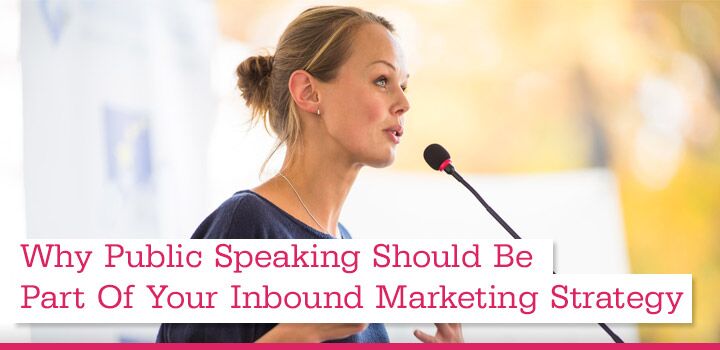
Experts have customers coming to them, they don’t need to resort to cold calling to drum up business. It can be difficult to get an inbound marketing strategy kicked-off. Building the momentum to attract leads takes a while. So what’s the solution to building your expert profile quickly? Public speaking.
In my view public speaking that educates the audience firmly sits as an inbound marketing tactic. We’ve all been to some sort of public speaking event that is very salesy - they aren’t great. In contrast a talk or seminar from an expert in a subject we are interested in leaves us inspired.
Experts Speak
Well all know public speaking is a daunting prospect. Even the most accomplished speakers get nervous when they’re standing on a stage. So when we experience a good presentation from an accomplished speaker - most of us will consider them an expert.
At LexisClick we’ve developed the EXPERT Marketing Model™ - in our experience it is one of the best methods for attracting inbound leads from your marketing. Take a moment to bring to mind some of the experts in your field. Do they speak in public? I bet they do.
How to get speaking opportunities
The first step in getting speaking opportunities is to write. If you aren’t already contributing to your company’s blog, this is a great place to start. If you are then you’ve already taken the first step. Even if you aren’t a confident writer, you can get your marketing team, agency or a copywriter to help out. Getting one of them to interview you can be a great way to get started.
The second step is to create your own opportunities. Run your own seminars or training sessions for customers and prospects. The only downside to this is that you’ll need to create and invite an audience to attend. If you have a company database, this shouldn’t pose too much of a problem.
The third step is to get speaking opportunities at industry conferences and events. Start by identifying relevant industry events. Most of them will have speaking opportunities. So you just need to find the right contact and pitch them your idea.
It will really help if you have blog posts and ideally videos for them to reference. The more public speaking you do, the better you’ll get. It will also give you references that you can use when pitching your next speaking opportunity. If you're good, you’ll then start to get invited directly. A great sign that you’re doing a good job.
Make your own videos, webinars and live streaming
Making your own videos is a great form of public speaking. You can practise, rehearse, re-shoot and edit - meaning there’s nothing to worry about. Making a good video will take some effort. If you haven’t done it before it will be well worth finding someone with experience who can do the filming. If you use a decent company, they’ll set everything up correctly, direct you and edit the filming into the final video. You want to create the right first impression, so invest in your video.
If you are committed to public speaking, videos should be part of your plan. They will give you invaluable practice. You can watch them back and learn how to improve your presentation. They’ll also provide a great reference point when pitching ideas to event organisers and you can market them in their own right. Make sure you promote your videos on your website and in YouTube.
Webinars and live streaming have very similar benefits to standard videos. These will generally be run in a similar format to a physical seminar. The main difference is that you won’t be getting the same face-to-face interaction with your audience. Even so, done well they should leave a similar impression on your audience. They are also generally a lot cheaper than running a physical event. You can also record them and use them as stand alone videos in their own right.
Running your own event or speaking at an organised event?
Running your own event has a number of benefits. Firstly you get to select the audience. For example you might want to make sure that competitors or known tyre kickers are left off the invite list, to make sure that only potential customers attend.
Running your own event also gives you the opportunity to work the room more easily. You’ve positioned yourself as an expert with a select group. On the basis they’ve volunteered to attend - it means they want to hear what you have to say. So speaking with them before and after you’ve spoken should be a lot easier.
The downside is that running your own events typically take quite a bit of organising and a lot of marketing to get a decent attendance. You’ll also only be getting in front of people who know you already.
On the other hand attending a pre-organised event will more often than not get you in-front of a wider audience. As long as it is a decent sized event, attendees of your talk will have the option of seeing you - which implies that those that see you are really interested in what you have to say. At the right event you’ll be getting in front of a number of people who aren’t particularly familiar with you already. In addition if it is a well known event this will lend you credibility and support your expert profile.
Preparing and presenting your talk
- Be clear about the goal of your presentation. Your audience will only remember 3 or 4 points - so make sure you know what you want to get across.
- Have a big idea - one thing you want them to remember after seeing you.
- Create rapport with the audience by telling them a story they can relate to, or associating with them
- Make sure you know your audience, their profile and interests - to keep your talk relevant
- Remember you are educating, not selling - they’ll be attending to learn - not to be sold to
- Practice, practice, practice, get friends, family or colleagues to critique you. Practice in front of a mirror or even better video yourself and watch it back
- Make sure your practice runs are shorter than your full time slot. It is always better to finish early and have time to answer questions, than to rush or run out of time.
Get started today
- Decide on the message you want to get across and how this will attract opportunities
- Practice this message by writing blog posts
- Create some short videos to get into the habit of public speaking
- Identify local events that you can speak at to build your confidence
- Put on your own event for your contacts
- Identify bigger events with speaking opportunities, so that you can infront of a lot more people.
Public speaking is a small, but powerful part of developing an effective inbound marketing strategy. Find out more about developing a strategy for your business here.

